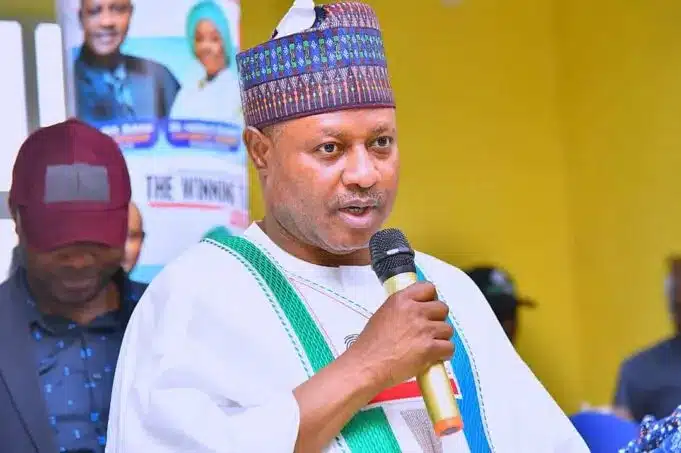By Sebastian Eshiomogie
With Bola Ahmed Tinubu’s election as president in 2023, Nigerians had tempered expectations, having been worn down by the difficulties of the previous administration.
The people had become desensitized to hardship and were adjusting to their new reality. It was a time when Nigerians were learning to navigate their challenges, and all they sought was a leader who could either reverse their situation or provide stability. They had taken ownership of their fate, and all they required was someone to guide them towards a better future or prevent further decline.
But in a shocking move on his inaugural day, President Tinubu caught Nigerians off guard by unveiling some controversial policies: removing petroleum subsidy, allowing the naira to float, and months later, hiking electricity tariffs. The president’s decisions were akin to pulling the rug from under the people’s feet, leaving them gasping for breath. The sudden and drastic changes were like a triple punch to the nation’s gut, leaving many feeling stunned and reeling.
Despite the far-reaching consequences of these controversial moves, the administration failed to introduce any substantial policies aimed at alleviating the suffering of the people. The absence of a comprehensive plan to soften the blow left the citizens vulnerable to the harsh realities of the government’s decisions.
With a handful of exceptions, President Tinubu’s cabinet appointments have been widely regarded as the most underwhelming in Nigeria’s history. A significant majority of his ministers appear ill-equipped to handle the demands of their respective portfolios. Even worse is that, the Central Bank Governor, Oluyemi Catdoso, has demonstrated a striking lack of vision in shaping the country’s monetary policies, leaving many to question his suitability for the office.
Recently, Cardoso, directed commercial banks to transfer funds from dormant accounts to the CBN, purportedly for safekeeping. This move has been likened to a financially struggling parent who, upon receiving a cash gift from a generous relative for their newborn, promptly seizes the money, claiming they will hold onto it for the child till when he or she comes of age. The CBN’s policy is seen as a brazen attempt to confiscate funds, pressuring the already precarious liquidity situation in banks.
This comes on the heels of a 50% tax on forex gains, which, while questionable, is somewhat justifiable. However, this latest move is utterly infuriating, and Cardoso’s justification that the CBN aims to safeguard the funds and return them with interest when the rightful owners come forward is nothing short of shame.
Nigeria has suffered an unprecedented economic downturn during President Tinubu’s first year in office, plunging the nation into a severe financial quagmire that threatens to boil over into social chaos if urgent and effective remedies are not promptly implemented. Nigeria, a nation of over 200 million people, is at a critical juncture.
The ongoing #EndBadGovernment protests, now going to a week, has brought to the fore the deep-seated frustrations of a people exhausted by hunger, high inflation, poverty, and an unbearable cost of living. The demonstrations, which began peacefully, have escalated into violence, with many lives already lost and many more injured.
I watched a few videos circulating on social media yesterday, showing angry and hungry youths ransacking properties and warehouses in search of food, couldn’t help but think of how President Tinubu’s early policies have worsened the economic struggles of the country. This is a difficult truth to swallow, but the President’s refusal to take ownership of the crisis and call for action has only added to the woes of the nation. His lack of decisive leadership has allowed the situation to spiral out of control. Hunger is ravaging every part of the country. This is the only why responsible citizens would come out on a broaday light to ransack food hideouts.
The Constitution of the Federal Republic of Nigeria (1999) explicitly states in Section 14(2) (b) that the government’s raison d’être is to provide for the welfare and security of its citizens. This provision underscores the inseparable nature of these two concepts, implying that government’s legitimacy is predicated on its ability to ensure the safety and well-being of the people. When a government fails to fulfill this fundamental responsibility, it risks creating a governance vacuum that can degenerate into anarchy.
Sadly, the President has assembled an inner circle that is comprised of self-serving advisors who are insensitive to the plight of the ordinary people, instead feeding him a diet of deceit. The vindictive reactions by these group to Senator Ndume’s recent warning about the President’s isolation is a case in point. They have successfully manipulated the narrative around the protests, aiming to create the illusion of an ethnic and political backlash against the President, when the truth is that Nigerians are at their breaking point, exhausted by the relentless economic struggle and yearning for relief.
On his part, rather than focusing on his primary responsibility to stimulate economic growth, President Tinubu seems to be fixated on securing a second term. This is reflected in his misinformed notion that the protests are politically motivated or ethnically driven. The President should instead be confronting the harsh realities: Is the economy better off under his stewardship? Has the standard of living for Nigerians improved since 2023? Is the country not in the midst of a devastating food crisis? How has the cost of living changed since he took office? These are the pressing questions that should be driving the President’s decision-making if he truly prioritizes the well-being of the people.
A sage remark was made by someone yesterday, that even if ethnic factors are at play in the protests, the volatile situation in the north, which massively voted Tinubu, should have humbled him, especially given the widespread suffering under a southern leader. The country has had enough of futile political leadership that mismanages the nation’s wealth, condones ineptitude, and encourages corruption, cronyism, and empty gestures. The people yearn for a departure from this self-serving leadership and demand a genuine commitment to their well-being.
The roots of this crisis are deep and complex. Years of economic mismanagement, corruption, and policy failures have culminated in a perfect storm of hardship and discontent. The country’s economic growth has been stagnant, with inflation soaring to over 40% and unemployment rates skyrocketing. The people, who have borne the brunt of these failures, have justified why the people have taken to the streets to demand change.
The protesters’ demands are not unreasonable. They seek an end to the economic hardship that has become a hallmark of life in Nigeria. They demand policies that promote job creation, reduce inflation, and make basic necessities affordable. They yearn for a government that prioritizes their welfare and well-being and cut down cost of running government.
President has called on the protesters to sheath their sword and come to the table for dialogue, but this is woefully inadequate. Mr. President, the time for rhetoric is over. The people need concrete actions, not empty promises. A single pronouncement by the President can change the whole situation and ends the ongoing unrest in the country. It is time to engage with the protesters, listen to their concerns, and work towards tangible solutions. The nation needs a comprehensive economic reform plan, one that addresses the root causes of poverty and inequality.
The international community watches with growing concern as Nigeria teeters on the brink of chaos. The country’s stability is crucial to regional security and economic growth. It is essential that the government acts swiftly to prevent further escalation.
Mr. President, the fate of Nigeria hangs in the balance. The people have spoken; it’s time for you to act. Engage with the protesters, address their concerns, and work towards a brighter future for all Nigerians. The clock is ticking.





